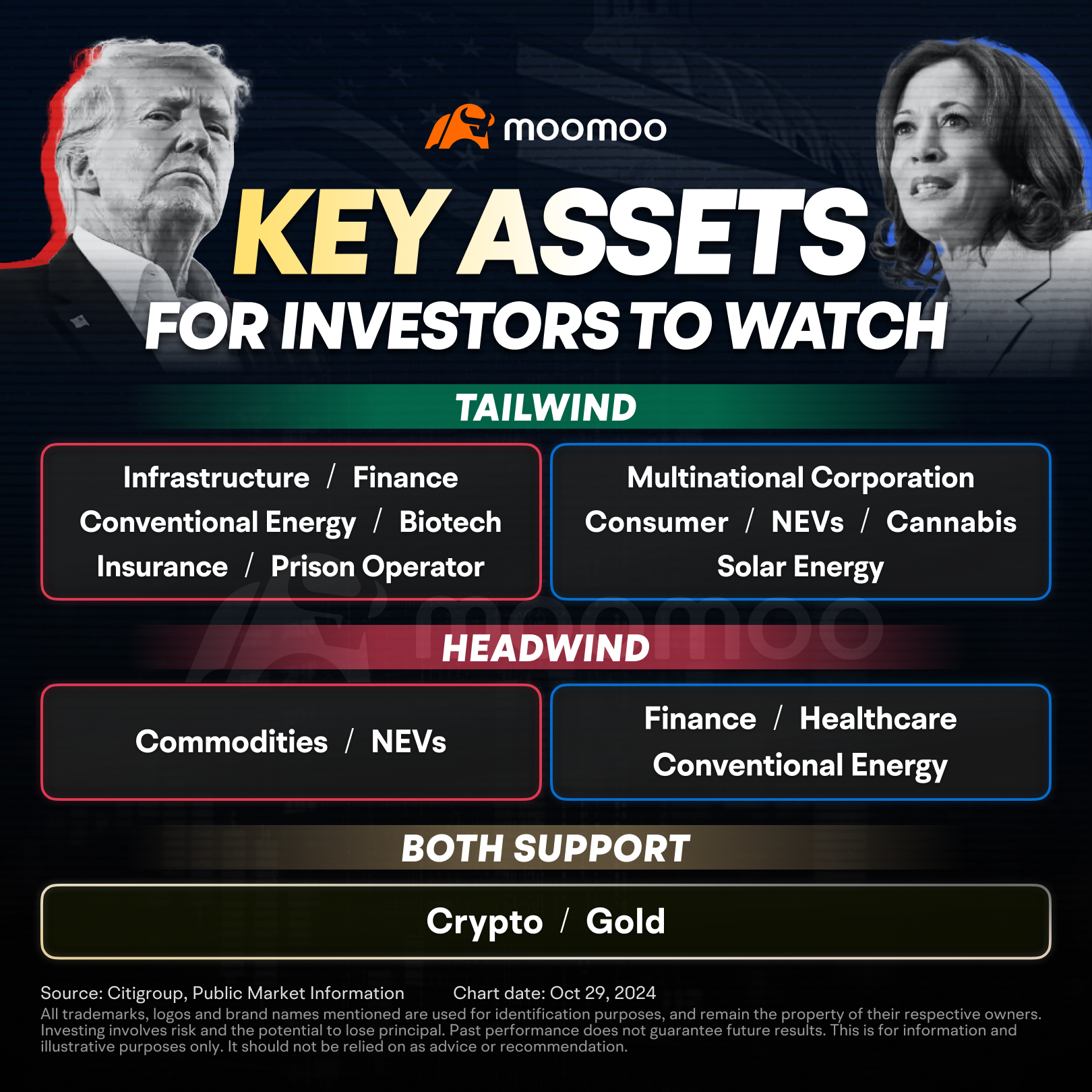By Jerry Kronenberg and Rayshawn Lin | Moomoo News
Election Day 2024 has finally arrived in the United States nearly two years after former President Donald Trump kicked the race off in November 2022 by announcing a bid to reclaim the White House.
The period since then has seen Trump and current President Joe Biden beat challengers within their own parties during the primary races, then Biden became the first incumbent American leader since 1968 to drop out of the race. Trump also survived two apparent assassination attempts.
 Biden’s decision to quit the race means that the Republican Trump will face Democratic Vice President Kamala Harris in Tuesday’s race, which will have several historic firsts no matter who wins.
Biden’s decision to quit the race means that the Republican Trump will face Democratic Vice President Kamala Harris in Tuesday’s race, which will have several historic firsts no matter who wins.
An Election With Many Firsts
A Trump victory will mean the former president will become the first ex-U.S. leader to win two non-consecutive terms since Grover Cleveland did so in 1892. (In fact, Cleveland is the only ex-president in history to have done so.)
Trump would also become the oldest person ever elected president, as the 78-year-old is about four months older than previous record-holder Biden was in 2020.
Conversely, a win by Harris would make her the first woman president in U.S. history. She would also become the first president of South Asian descent (her mother came from India) and the first female leader of color (her father hails from Jamaica).
Additionally, Harris would be the first sitting vice president to win elevation directly to the presidency since George H.W. Bush did so in 1988, and only the second person to do so since Martin Van Buren in 1836.
What the Polls Say
Public-opinion polls mostly show the race as a statistical dead heat.
As of Monday, RealClearPolitics.com’s average of polls showed Trump just barely leading Harris nationwide 48.5% to 48.4%, although that would fall within most surveys’ margin of error.
However, securing the presidency doesn’t require winning the most votes nationwide. Instead, candidates must win the most votes in any combination of states that hold a majority of America’s population.
This year, voters in 43 states and the District of Columbia so clearly favor one candidate or the other that those areas' outcomes seem to be already known. Barring any surprises, that will give each candidate victories in states accounting for about 40% of the population.
Whoever wins three or four of the remaining seven “swing” states –– Arizona, Georgia, Michigan, Nevada, North Carolina, Pennsylvania and Wisconsin –– will likely hit the 50% mark and take the White House for the next four years.
As of Monday, Trump led Harris by 0.8% in an average of polls tracked by RealClearPolitics in the seven swing states (which are also known as “battleground” or “toss-up” states). However, that’s within most polls’ margins of error.
Markets will closely watch the election’s outcome given that the two candidates have very different economic policies.
Here’s a look at where the candidates stand on some economic issues, and how a victory by one of the other might impact markets:
Trump’s Economic Policies
The Republican former president is widely known for taking a tough line on foreign imports, having imposed tariffs on foreign goods in his first term and promising even more if he wins a second one.
The current market sentiment suggests that if Trump wins, he will also support traditional energy and infrastructure projects. For instance, Trump wants to focus on more fossil-fuel development, while Harris is expected to continue Biden's support for clean energy.
Also, Trump's promises to crack down on crime and illegal immigration suggest more incarcerations, which could boost profits for publicly traded companies that operate prisons for government agencies.
Trump has also said he will extend temporary tax cuts that passed during his first administration, but which are due to expire in 2025.
Additionally, he has promised on the campaign trail to cut taxes on restaurant workers’ tips, on retirees’ Social Security payments and to restore a tax deduction that his first administration reduced for state and local taxes.
All of that would likely add to the U.S. government’s annual deficits, which could increase interest rates on Treasury bills, bonds and notes. Higher deficits could also boost inflation, weaken the U.S. dollar and increase gold prices.

Harris’ Economic Policies
Harris has said she will cut taxes for low- and middle-income groups and raise them on the wealthy. That could increase consumer spending.
She also wants to increase U.S. exports, which would help large multinational companies. Similarly, her support for clean energy would probably benefit electric-vehicle stocks.
But like Trump, Harris has announced plans that would likely increase the U.S. government’s deficits, which could boost Treasury yields, weaken the dollar and send gold prices higher.
How Will the Election Impact Bitcoin and Other Cryptocurrencies?
Both Trump and Harris have spoken out in favor of cryptocurrencies, although crypto markets seem to see Trump as more of an ally.
For instance, the Republican said during a campaign speech that he wants to make America the "crypto capital of the planet.”
Harris has also said she supports digital currencies "while protecting our consumers and investors." Markets have interpreted that as a call for closer industry regulation.
Still, options traders have recently been betting that Bitcoin could reach a record-high $80,000 this month regardless of who wins.
